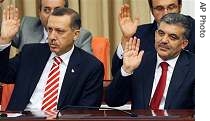-
(单词翻译:双击或拖选)
Istanbul
20 August 2007
Turkey's new parliament, divided along party lines, could not elect a president Monday, as frontrunner Foreign Minister Abdullah Gul failed to secure the two-thirds majority needed in a first round of voting. For VOA, Dorian Jones reports from Istanbul.
Turkish Foreign Minister Abdullah Gul has failed to win enough support to be elected president in the first round of voting in Turkey's parliament.

Turkey's FM Abdullah Gul, right, and PM Recep Tayyip Erdogan, raise hands after results of first round of voting, 20 Aug 2007
Mr. Gul, a member of the ruling Justice and Development Party, or AK party, received 341 votes in parliament Monday, short of the 387 needed for the two-thirds majority required for a first-round election.
Despite the defeat, he is expected to win in a further round next week. In the third round, a candidate only needs to secure a simple majority of votes, which the AK Party has, but that could herald1 tense times ahead, analysts2 say.
In April, the main opposition3 party boycotted4 the initial presidential vote, labeling Mr. Gul, a devote Muslim, a threat to the secular5 system.
Protesters took to the streets in protest of Mr. Gul's candidacy and the military warned it was ready to step in. But since then, the AK party has been returned to parliament with 46 percent of the vote.
Speaking just before Monday's vote, Mr. Gul said the fact that the ruling party was voted back into power was proof that most Turks do not believe he has an Islamic agenda. Despite the victory, political columnist6 Nuray Mert says Mr. Gul remains7 a divisive candidate.
"There must be a compromise and consensus8 on the issue of the presidency9 and Gul can be hardly be a name of compromise and consent," said Mert.
There already has been, much debate because Mr. Gul's wife wears the Islamic headscarf. Religious dress is banned from many state buildings and many secularists are opposed to the idea of the country's first lady wearing a religious headscarf.
Mr. Gul is now working hard to bridge the deep divisions within Turkish society over his bid. On announcing his candidacy last week he pledged he would defend secularism10.
"My priority is to follow the Turkish constitution and its principles of secularism and the rule of law," he said. "My guide will always be upholding the constitution."
In the last week Mr. Gul has been courting all the opposition parties, along with trade union and business leaders. Those efforts are expected to continue in the coming days as parliament continues to vote on the presidency.
 收听单词发音
收听单词发音
1
herald

|
|
| vt.预示...的来临,预告,宣布,欢迎 | |
参考例句: |
|
|
|
2
analysts

|
|
| 分析家,化验员( analyst的名词复数 ) | |
参考例句: |
|
|
|
3
opposition

|
|
| n.反对,敌对 | |
参考例句: |
|
|
|
4
boycotted

|
|
| 抵制,拒绝参加( boycott的过去式和过去分词 ) | |
参考例句: |
|
|
|
5
secular

|
|
| n.牧师,凡人;adj.世俗的,现世的,不朽的 | |
参考例句: |
|
|
|
6
columnist

|
|
| n.专栏作家 | |
参考例句: |
|
|
|
7
remains

|
|
| n.剩余物,残留物;遗体,遗迹 | |
参考例句: |
|
|
|
8
consensus

|
|
| n.(意见等的)一致,一致同意,共识 | |
参考例句: |
|
|
|
9
presidency

|
|
| n.总统(校长,总经理)的职位(任期) | |
参考例句: |
|
|
|
10
secularism

|
|
| n.现世主义;世俗主义;宗教与教育分离论;政教分离论 | |
参考例句: |
|
|
|















